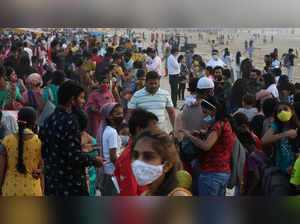
However, the cases will see a fast jump and a fast drop, said Anurag Agrawal, chair of the World Health Organization's (WHO) technical advisory group on Sars-CoV-2 virus evolution.
He expects cases "in the metros to quickly decline and restrictions to be removed". "Smaller places, peripheral regions, like, for example, the Northeast, will see surges next, but again fast up, fast down," Agrawal said.
Both Mumbai and Delhi were reporting a surge till last week.
Agrawal said he would not expect Mumbai to reflect the peak for the state as Maharashtra is a big state. For Delhi, he said, "peak is crossed, but outbreak is not over". Senior epidemiologist Giridhara Babu said the cases may be dropping but it's too early to draw any inference.
He pointed out that the test positivity rate (TPR) for both Delhi and Mumbai continues to stay high, which reflects reduced tests. "As of January 14, the TPR for Delhi is at 30%, and for Maharashtra it is 22%," Babu said. "This high test positivity and sustained high reproduction number only suggest that the infection spreads to peri-urban and rural areas, especially after all the restrictions are removed. Although we are heading toward the decline of the peak, it is a little early for conclusive inference."
He said if testing is improved in rural areas, then one will see an increase in cases, especially in rural Maharashtra. "Therefore, it will take another two to four weeks for the trajectory to be well tracked," Babu said.
Agrawal, too, said the risk of the pandemic remains. The bright side, he said, is that with growing immunity, more and more people will be able to successfully fight off the infection in future waves, as long as the virus does not change by too much.
And on the flip side? "Remember that the flu virus has been with us for thousands of years, yet epidemic/pandemic risk remains," Agrawal said. "It is the nature of viruses to evolve. It takes time. But the more the infections, the more the opportunity to evolve," he said.
Read More News on
Download The Economic Times News App to get Daily Market Updates & Live Business News.
Subscribe to The Economic Times Prime and read the ET ePaper online.
Read More News on
Download The Economic Times News App to get Daily Market Updates & Live Business News.
Subscribe to The Economic Times Prime and read the ET ePaper online.









 Get Unlimited Access to The Economic Times
Get Unlimited Access to The Economic Times
